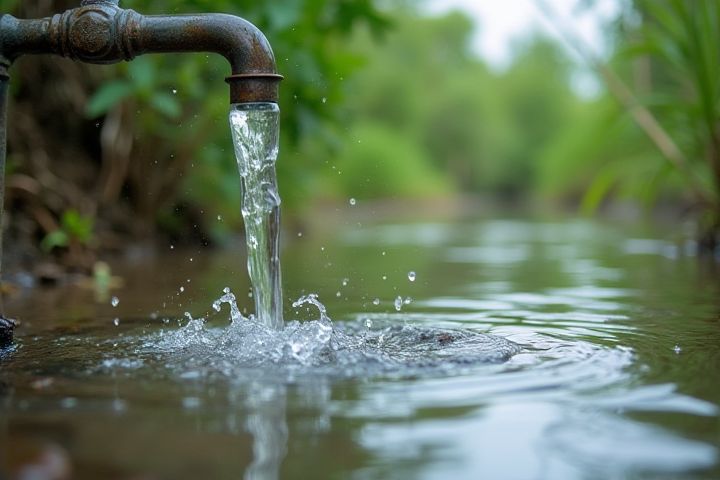
Nigeria is endowed with abundant water resources, comprising rivers, lakes, and groundwater aquifers. The major rivers, including the Niger and Benue, play a critical role in supporting agriculture, which is vital for the nation's economy. Groundwater aquifers serve as essential sources for drinking water, especially in rural areas where surface water may be scarce. The country's various lakes, such as Lake Chad, contribute to fisheries and biodiversity, providing food and livelihood for local communities. Sustainable management of these water resources is crucial to addressing challenges like pollution, over-extraction, and the impacts of climate change on water accessibility.
River Niger and River Benue are the major river systems
Water resources in Nigeria predominantly revolve around River Niger and River Benue, the two major river systems that play a crucial role in the country's hydrology. River Niger, the longest river in Nigeria, stretches over 4,180 kilometers and serves as a vital source of water for agriculture, transportation, and fishing along its banks. River Benue, which is approximately 1,400 kilometers long, acts as a significant tributary to the Niger River, contributing to the drainage basin and supporting biodiversity. Together, these rivers are essential for sustaining the livelihoods of millions, highlighting the importance of effective water management strategies in Nigeria.
Nigeria has numerous lakes and reservoirs
Nigeria's diverse water resources encompass numerous lakes and reservoirs, such as the expansive Kainji Lake and the Olokola Lagoon, crucial for irrigation and fishing. The Niger River, the country's principal waterway, supports transportation and agricultural activities while contributing to hydropower generation. These bodies of water also play vital roles in local ecosystems, providing habitats for various aquatic species. Effective management practices are essential to ensure the sustainability of these resources, benefiting both communities and the environment.
Seasonal rainfall variation affects water supply
Seasonal rainfall variation significantly impacts water supply in Nigeria, creating periods of scarcity and abundance that vary regionally. The country relies heavily on its freshwater resources, including rivers, lakes, and groundwater, which are influenced by changing climate patterns. Deforestation and urbanization exacerbate the challenges of managing these vital resources, leading to reduced water quality and availability. Understanding these dynamics is crucial for sustainable water management and ensuring access to clean water for the population.
Groundwater is a critical resource for rural areas
In Nigeria, groundwater serves as a vital source of freshwater, particularly in rural areas where surface water is limited or contaminated. The porous geological formations allow for significant aquifer recharge, making it essential for agricultural irrigation and domestic use. With around 70% of the population relying on groundwater, its sustainable management is crucial for food security and public health. Enhanced measures in groundwater conservation can directly improve your community's access to clean water and overall well-being.
Nigeria's water resources face pollution challenges
Nigeria's water resources are abundant, with major rivers like the Niger and Benue providing crucial supplies for agriculture, drinking, and industry. However, pollution from industrial waste, agricultural runoff, and inadequate sanitation poses significant threats to water quality throughout the country. Urban areas, in particular, struggle with the contamination of surface and groundwater, impacting both public health and ecosystems. Ensuring clean and sustainable water resources requires a multifaceted approach, including improved waste management practices and stronger environmental regulations.
The country experiences frequent flooding
Nigeria's water resources are diverse, encompassing rivers, lakes, and aquifers that play crucial roles in agriculture and rural communities. The nation frequently experiences severe flooding, particularly during the rainy season, which can cause extensive damage to infrastructure and livelihoods. Major rivers like the Niger and Benue contribute to both irrigation and the flooding risk, highlighting the need for effective water management practices. By addressing these challenges, you can enhance sustainable water use and mitigate the impacts of climate change on local ecosystems.
Rapid urbanization increases water demand
Nigeria's water resources are under significant pressure due to rapid urbanization, which dramatically escalates the demand for clean and accessible water. Major cities, such as Lagos and Abuja, experience heightened competition for limited freshwater sources, often leading to supply shortages and increased reliance on groundwater. The challenge is compounded by inadequate infrastructure, making it difficult for many residents to access reliable water services. Effective management strategies and sustainable practices are essential to ensure the long-term availability of water resources in this rapidly growing nation.
Water scarcity impacts agriculture and livelihoods
Water scarcity in Nigeria significantly affects agricultural productivity and the livelihoods of millions. With approximately 70% of the population engaged in farming, limited access to clean water hinders crop yields and increases vulnerability to food insecurity. This situation is exacerbated by climate change, leading to erratic rainfall patterns and prolonged dry spells, which further strain water resources. Ensuring effective water management and sustainable practices is crucial for enhancing food security and improving the overall quality of life in affected communities.
Multiple international water agreements
Nigeria engages in various international water agreements to effectively manage its abundant water resources, including the Niger Basin Authority and the Lake Chad Basin Commission. These agreements facilitate cross-border cooperation in water usage, ensuring sustainable practices that benefit multiple countries sharing these vital resources. The country's diverse ecosystems, such as its rivers, lakes, and wetlands, play a crucial role in agriculture, fisheries, and overall biodiversity, underscoring the importance of responsible management. By adhering to these treaties, Nigeria aims to address challenges such as pollution and water scarcity, ultimately enhancing water security for its population and neighboring regions.
Government initiatives aim to improve water management
Water resources in Nigeria are primarily influenced by various government initiatives designed to enhance water management and sustainability. These programs target the efficient allocation and preservation of both surface and groundwater resources, addressing significant challenges such as pollution and inadequate infrastructure. With an emphasis on providing clean drinking water and irrigation for agriculture, the government collaborates with local communities and international organizations to implement innovative solutions. By investing in technology and education, these efforts seek to ensure equitable access to water, vital for the nation's health and economic development.
